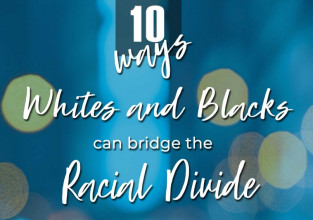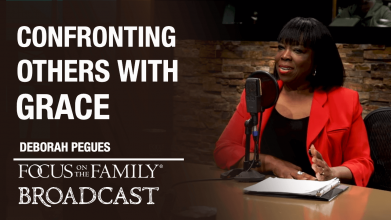Excerpt:
Mrs. Deborah Pegues: You got to start your individual track and say, “I’m going to make a difference. I’m not going to be stuck in anger. I’m not going to be stuck in hate. I’m not – I’m going to stop wishing for a better past. I’m going to start working towards a better future.”
End of Excerpt
John Fuller: Well, that’s Deborah Pegues. And she’s with us today on Focus on the Family. Your host is Focus president and author, Jim Daly. And I’m John Fuller.
Jim Daly: Let’s face it, John. We live in an angry world, don’t we?
John: We do.
Jim: People are riled up over politics, different situations, misunderstandings, religion. The list goes on and on, especially in the midst of a global pandemic. We have that as well. Unresolved racial tensions are rising and, you know, highly contested Presidential election right in front of us. So, Scripture repeatedly urges us to rein in that anger. And it’s one of the more difficult disciplines for the Christian community. One verse that comes to mind is James 1:19 from the New Testament. “Let every person be quick to hear, slow to speak and slow to anger.” And here at Focus, we certainly want you to live freely in Christ. That’s the goal and that’s what it’s all about. Even if anger isn’t a problem for you, and I hope it isn’t, I’m sure at some point when that guy cut you off on the freeway, it might rise a little bit.
John: (Laughter).
Jim: And what are you going to do? Today, we want to help you understand where anger comes from, how to control it, how to channel it, how to figure out what is good anger, what is bad anger. And we have a wonderful guest today. One of your favorites.
John: Yeah. Every time Deborah is on, we have a great groundswell of response.
Jim: We do.
John: And, uh, she is certainly accomplished. She’s a certified behavioral consultant, a Bible teacher, international speaker. She’s written a number of books. And the one we’re going to be really zeroing in on today has to do with the topic of anger. It’s 30 Days to Taming Your Anger. And we do have copies of that here at Focus on the Family.
Jim: Deborah, it is great to have you back here at Focus.
Deborah: Thank you so much. I’m mad as heck and I’m not going to take it anymore.
(LAUGHTER)
Jim: Well, you’re coming to us from L.A., so I get it. L.A.’s been one of those areas that have had a lot of things going on.
Deborah: Yeah.
Jim: But let’s – let’s start with, kind of, the more personal aspect of it. Why does anger have such an impact on us and why do we let it get a hold of us so quickly?
Deborah: Well, I am going to start back with the fact that in the United States, we are a country of rugged individualism. (Laughter) So, everything upsets us if it doesn’t go our way.
Jim: Interesting.
Deborah: But I’d like to just start out by defining anger. Really, it’s just an emotion of protest. So, we’re always protesting something. That’s kind of in our DNA as Americans.
Jim: Right. In fact, you describe three degrees of anger. So, help us get a handle on those three. What are they? And how do they impact us?
Deborah: Well, and these aren’t obviously an absolute. But this is what – how the Lord gave it to me. Irritation, frustration, and infuriation. It goes from mild to bad. (Laughter)
Jim: Right. That’s the way to say it. Talk about irritation. Let’s describe that and maybe an example would help the listeners better get it.
Deborah: Yeah. You know, those are things that people do just kind of get under your skin. They’re speaking too loudly on the cell phone in public or your husband comes into the room and you’re watching your favorite show and he starts to ask you questions about it.
Jim: Yes. Okay.
Deborah: Or sometimes he’ll leave a switch the channel just for a minute.
Jim: (Laughter).
Deborah: Those are all very irritating. (Laughter) Irritating.
Jim: That is irritating. I agree with all of those.
Deborah: Yeah. Yeah.
John: (Laughter).
Jim: So, now that’s – that’s the low burner setting. What’s the medium burner?
Deborah: Well, then, the frustration is somebody’s blocking a goal that you’re trying to reach. So, let’s say you are on the freeway and you’re trying to get over, they’re trying to get over, too, but you had the right away and whatever. So, that’s – that – what you call it? The frustration. I’m just, “Oh, just can’t – you’re stopping me from doing something that I’m trying to do.” And it can be a small thing as well. And so – and it’s, again, it’s not as serious as infuriation where I am like, totally furious now. And I think what we’ve seen in our culture and seeing in our culture is one of those instances where people are infuriated. They’re at the top of their anger in terms of what has happened just across the country, that the response to the covid virus – just all kinds of things that we’re just finding for infuriated about. You know, and this is what it is.
Jim: Okay. So, those are really good descriptors. So, I want to kind of dig into each one. The irritation side. How can we keep from being irritated? It sounds impossible. I mean, you get irritated because something right in front of you happens. And to have the discipline to be able to say, “Okay, I’m not going to be irritated.” It’s almost angelic, right. It’s beyond human capacity. But you’re saying it’s not.
Deborah: No, I am saying it is beyond human capacity. You said it right. It requires some heavenly intervention. (Laughter)
Jim: There we go. Yeah.
Deborah: The bad individual. It really does. But it requires us to operate in grace and longsuffering and patience and aren’t those, like, fruit of the spirit? I always like to say that and to say it slowly. The ability to cope with these things have to come out of a spirit that empowers you to do it. I – I can’t do it by myself. I can tell you this. I don’t like what people just chew loudly. I don’t know what it is.
Jim: (Laughter).
Deborah: I – I looked it up and I understand there’s something in your ear that makes it like that. (Laughter)
Jim: Macaroni and cheese. Listening – listening to people eat macaroni and cheese. Drives me crazy. I can’t do it. I got to leave the room.
(LAUGHTER)
Jim: I – it’s funny.
Deborah: Really?
Jim: It’s like – it’s like nails on a chalkboard for me – the smacking noise. (Laughter) There’s my irritation.
John: So, where’s the grace of God in Jim listening to somebody eat macaroni and cheese?
Deborah: I can’t help him out because I can’t stand for him to eat popcorn or anything that makes a sound.
Jim: (Laughter).
Deborah: And I feel so sorry for Darnell’s eating sometimes and he has corn chips or something. You know, those are very loud.
Jim: Yeah. They are.
(LAUGHTER)
Deborah: And I’m just sitting there going, “Jesus, please help me right now.” (Laughter)
Jim: Okay. Right. Exactly, Deborah.
Deborah: But…
Jim: Now some…
Deborah: But here’s to do deal…
Jim: Yeah.
Deborah: …With it, you know, when you got do with it because you got to ask Him. Listen, I’m not kidding you. I say, “God, help this not to irritate me.” And I just, you know, I just start to back it back. Why is this irritating me? I’m – I’m thinking – I’m trying for it not to. But I just asked God and what I do sometimes I suffer through it without saying anything, because you know what that does? (Laughter) That teaches my flesh that I can’t always have things my way.
Jim: Yeah. And, you know, a context for this. You mentioned a moment ago – the – the fruit of the spirit. For those of us that are Christians, we know that’s love, joy, peace, goodness, kindness, mercy. I remember – and patience – I remember somebody saying to me one time, “You know, I don’t have much patience.” And the thought struck me, and I did say this out loud. I probably shouldn’t have. But I said, “Well, I don’t think it’s like a menu that you order from.” Right?
(LAUGHTER)
Jim: As a Christian, you don’t say, “Well, I’ll take a dose of patience and four helpings of love.” I mean, if you’re in Christ, these attributes should be present in your life. And if they’re not, you may want to reconsider if you’re truly rooted in Jesus.
Deborah: Well, I say – this is what I say. The extent to which you can exemplify the fruit of the spirit. I got to really get that word in people today. It is produced by the Spirit. So, to the extent that you – you have to really practice that so that you develop that fruit. Now I’ll just say, “God, this fruit does not develop. It is so raw.” Right? (Laughter) “It is so limp. It’s still a seed.”
Jim: Yeah. And the main point is, if you don’t have a lot of patience, that means work on it. Don’t use it as an excuse to be impatient.
Deborah: Yes. Absolutely.
Jim: Hey, Deborah, you were called by God to write and to speak and you started writing this book on anger. What were some of the instantaneous obstacles that you confronted when you started to speak about this topic? How was the Lord dealing with you?
Deborah: Well, let me do it. The frustration I had in writing. I work at home. I have a nice home office. And people think because you work at home that you’re just available all the days – all day to do something.
Jim: (Laughter) Right.
Deborah: So, I would be writing they would just call me. “How are you doing?” And I’m thinking, “Why am I answering the phone?” So, I have to have a predetermined coping mechanism for dealing with some frustrations. But here’s what I know, and I have to believe this. And I always say all behavior comes out of a belief. I have to believe that sometimes that – that’s a Divine interruption. Or whatever it is that’s blocking my progress, I have to step back and say, “You know what? There may be something Divine, something going on here.” And so, I don’t always want to have this to do list that is so rigid, I’m so set on the goal until I can’t be flexible. So, they can’t deal with the frustration is to stop and acknowledge what could be going on. How many stories did we hear, um, when they had the 9/11 events of people who were delayed that day or whatever? I’m sure that some of them were probably frustrated that they were delayed, but, look, it saved their lives. So, we just got to stop. Put that in perspective as well.
Jim: Yeah. That’s exactly right. Let me ask you this before we move to the next level, the highest temperature of anger – infuriation. What is the difference between irritation and frustration? Do you handle frustration differently or what are the added things you need to do to de-escalate your frustration?
John: Hmm.
Deborah: Well, you have to have a mindset about frustration, because keep in mind, all of these things generate from us. Nobody is, quote, “irritating us.” That’s how we’re choosing to respond. Nobody’s frustrated us deliberately. Most of the time it’s not deliberate. So, or -and then sometimes it’s not somebody. It could be traffic. It could be anything. So, we have to have a mindset that no matter what happens today, I’m going to guard my peace. I’m going to guard my heart. And that’s what you have to do, especially when you live in Los Angeles and you get to drive the freeway.
(LAUGHTER)
Jim: That’s right. That’s right.
John: You’ve been there, Jim. So, you know that. Yeah.
Jim: Grew up there.
John: Always energetic and optimistic. This is Focus on the Family and we’ve got Deborah Pegues with us today. And we want to drive your attention to her book, 30 Days to Taming Your Anger. You can get that directly from us at focusonthefamily.com/broadcast. And, uh, we know that anger – while we’re having some fun here – can be a very difficult emotion to deal with, so let me remind you we have a team of caring, Christian counselors on staff here at Focus on the Family. Give us a call. We’ll arrange a time for someone to call you back and talk through your circumstances with you. It’s free and our number is 800, the letter A and the word FAMILY.
Jim: Deborah, let’s move to the, uh – the hottest temperature of anger. That’s the infuriation that people can feel. And that’s like a visceral response. Your body feels it. You’re – it’s so angering to you that it’s a full body response – your mind, your body. I mean it’s like fight or flight. That’s the impression I get. A: is that description accurate? And then give us an example of how you noticed that higher level of anger in you.
Deborah: Well, you feel it. You know, you pump more blood. You just feel your pulse increase. This is the point where you have to really, really, really manage yourself and do some self-talk because it’s like a seesaw in your mind. If the emotions are high, the rationale is low.
Jim: Huh.
Deborah: And so, you want to stay really rational because the person who is most rational is going to be the most powerful in that – in that environment or that situation. So, you got to really start to talk to yourself and you got to tell yourself this is working together for my good. I was getting on the freeway and I was already late trying to get downtown L.A. and a car came up besides me and just almost ran me off the road. I was so afraid. I was so afraid. And I realized sometimes at the root of being infuriated was the fears of what could have happened. And so, I thought, “Man, I wish I had a B.B. gun or something.” (Laughter)
Jim: Right, no.
Deborah: “A gun – a gun that wouldn’t kill somebody, but that could really inflict pain.” Because when we are angry, we want to retaliate, which means to return the punishment. And so, we got to really manage ourselves when it comes to that. And again, that comes back to having a strong sense of grace and say, “I’m going to extend grace.” Not because you want to just, like, ignore that. It’s for you. You want to stop that flow of adrenaline. You want to – you want to stay in control. You don’t want that seesaw too high on the emotional side.
Jim: Well, that’s so true. And I actually was laughing as I was reading the book and looking at the prep. I was mentioning to my wife, Jean, one of your stories (laughter), which is so funny because I can relate to it. You and your husband had a 21 day fast and you go to a restaurant, a buffet style restaurant, and something went wrong. And that was one of your examples where you kind of lost it. But I was laughing because I was with you. I said, “I’d be in the same boat after not eating for 21 days.”
Deborah: (Laughter).
Jim: You go to a restaurant. What happened and why did that set you off?
Deborah: Well, it set me off because it was one of those restaurants where it’s like a smorgasbord buffet.
Jim: (Laughter).
Deborah: But at any rate, I put my purse down at the table. You know, you can do that in this kind of enclosure. And I came back and someone else was at our table eating already. And I’m thinking, like, “What happened here?” And I have to tell you this, because sometimes when the climate is sensitive like that and it was and they didn’t look like us, so let me say this. I thought that the white – white waiter had just superseded us and given somebody at our table like, “Oh, they can find another one.” What – that wasn’t what happened at all. But they felt so bad because I had my plate in my hands. And they didn’t see the purse on the floor, you know. And the lady said, “I’m sorry.” And I – you know, so I didn’t let them know I was upset, but I was just furious inside. And I thought, “You know what? There are other seats in this restaurant. You are overreacting.” (Laughter) “You’re just overreacting.”
Jim: Yeah. Well, no. I mean, that’s – that’s a great example of how you got to get control. And it’s also an example of how you rush to judgment on things, right?
Deborah: Absolutely.
Jim: That you could – you fill in these blanks that the other person’s not actually thinking or expressing. And that can lead you down a bad path.
Deborah: It can. And that’s why, why don’t we just decide we’re going to give everybody the benefit of the doubt?
Jim: Yeah. I mean…
Deborah: Wouldn’t that be a great strategy? That no matter what happens, I’m not going to assume the worst.
Jim: Okay. Now, let me parlay that into the cultural moment and because I think that’s a good onramp for that discussion. When you look at it, the inability of people to give the benefit of the doubt is rampant right now. I mean, certainly in the political sphere, that doesn’t happen because both sides are trying to incriminate the other side so they can get more votes or whatever. But that is, I think, cascading down to the culture where you have cable news and everything else that reinforces that opinion that you have of the other person, not the benefit of the doubt. How do we – particularly, how do we as Christians, decouple from that toxic energy? You know, and have a healthier attitude in a cultural melee like we see right now?
Deborah: And I’m glad you asked how do we as Christians, because I find that we are some of the biggest offenders.
Jim: (Laughter) Right.
Deborah: I – I am telling everybody. (Laughter) “Do not put anything negative. I am not political. Don’t put anything negative on my Facebook.” Listen, we’re going to have to be an example in this area. We are not an example. I know Christians who want even called the current President’s name. They call him “45.” I think that’s the number. And I’m thinking, “Really? What do you do with – what do you with that Scripture that says, ‘Pray for those in authority’?” We got to go back to the Book. We’ve got to go back to the Bible. All authority is of God. We need to begin to say, “Okay. God, has chosen someone to be in authority. He has a will and a purpose. No matter what.” But we are in a culture now, Jim, where you can’t even – if you don’t agree with somebody, they hate you. (Laughter)
Jim: Right. Or worse.
Deborah: You just can’t disagree. And so, I’m saying to those of us who really, really want to walk according to the word of God, can we start to set the example? Can we not be negative? Can we not be so slanted toward politics? I’m – at this point, I’m almost convinced it’s best not to say anything, but just pray. I really am. Because that’s practical, too.
Jim: Yeah, no, I…
Deborah: It’s just – it’s best not to put it out there because you know what? There may be people that you’ve been ministering to or you are impactful in their life and the minute they hear you on this side of the political spectrum, then they don’t like you anymore. To me, my message is bigger than politics.
Jim: Right.
John: Hmm.
Jim: And Deborah, I mean, another, you know, obviously touchy subject, but if we don’t talk about it, I think people will, you know, question the lack of sincerity in our discussion. But racial tension is huge right now. And, you know, you see the black lives matters movement and politicians and how they’re responding. ANTIFA is part of that equation. How do we in the Christian community – and I grew up in L.A. where you live. And, you know, it’s very multi-ethnic. That was my experience. My school – I lived in Compton for third and fourth grade. So, I – you know, I had a really wide experience living with people where I – you know, I wasn’t the dominant race in Compton. That wasn’t – I was the minority child. But speak to that issue directly. You’re an African-American woman. You know, what are we missing? Particularly, again, as Christians, what do we need to think about when it comes to ethnicity?
Deborah: I’m so glad you asked. And I’ve been writing about this and talking about it. I have put out a list of 10 things whites need to do and 10 things blacks need to do to break this racial divide. We’re going to have to begin to understand each other. I have found consistently that people who have a negative attitude towards the opposite race, they don’t have friends of that race. But here’s the deal. We’re going to all have to stop using this broad brush to paint a racist, all bad or whatever, because there is a lot going on. And let me just back up and say black lives do matter. And one of the most infuriating things is for people to say, “all lives matter.” When we hear people say that – I’m just going to – this is a heads up. When we hear people say, “all lives matter,” we know that they don’t care about black lives. Or I don’t say they don’t care, I just think they don’t understand. It’s like your house – your – your house is on fire and your and – and your neighbor comes over to say, “My house matters, too.” Yes, but yours isn’t on fire. (Laughter) We’re focusing on the one that’s been devastated right now. And so – and let me just say also that I don’t embrace all of the tenets of the Black Lives Matter organization, but the concept about black lives matter, that’s critical. We’re going to have to get to know each other. We’re going to have to hear our stories connect with each other. Let me understand you. Let you understand me. And then we’re going to have to repent for the things that we did that we shouldn’t have done. But I want to say this. You don’t have to repent if you haven’t done anything wrong. And one of the reasons it’s hard to have this conversation with whites is because it’s very uncomfortable. But I tell everybody, “Listen” – you know, I’m always, kind of, putting a funny spin on something. I was in a group and I said, “Raise your hands if you owned a slave.” Well, nobody owned a slave. See, you didn’t do it. So, you shouldn’t feel guilty about the sins of your ancestors, so give yourself a break, because the guilt will keep you from reaching out. And so, we’re going to have to reach out to each other. We really are. And I have a whole list of those things that I’m – I understand that you’ll be posting that. But blacks have to do something as well. And we’re going to have to put away the broad brush and we can’t get stuck in the anger. And we’re going to have to take the initiative most at a time to make you comfortable with us. Now, I’ll get flack with saying that, but I have experience in that area. I worked at a company and I was an affirmative action hire. And people would go to lunch and nobody would invite me. Well, being my little shy self – not.
(LAUGHTER).
Deborah: After (laughter) – after about a week of that when I saw a group gather and they were from my floor, I just put my purse on my arm and I said, “Do you guys mind if I join you?” And I said, “Of course not.” Well, I became friends a whole bunch of people when I left that company, I had five goodbye parties.
Jim: (Laughter) Oh, that’s a great example. But it’s still I realize that tension exists and perspective. You know, people are not monolithic, even, you know, by definition, race, or faith, et cetera. We have a variety of – of denominations in the Christian faith. People say, “Why is that?” Right? Because there’s different perspectives about what the Scripture is saying, et cetera. But I think that’s a good reminder for us, A: to get to know people that don’t look like us. I mean, that’s a great thing to do and, uh, particularly to get to know people within the body of Christ. You know, we shouldn’t have the most segregated day of the week being Sunday. And I’m proud to go to a church that’s multi-ethnic and, you know, it really gives us great diversity. Let’s go to another aspect of anger, Deborah. We often hear that anger is a secondary emotion, that there’s something else occurring. It’s, kind of, underlying the anger emotion. One of those you identify as fear. You’ve mentioned that a moment ago. Let’s tease that out a bit further. Why is fear or bitterness, perhaps, or unforgiveness roots of anger?
Deborah: Well, because, again, there’s a – you feel something before you feel anger. So, let’s give – let’s give an example that I gave it a bit earlier. The guy who almost made me wreck the car. Fear was at the base of that because he – I could have hurt myself or I could have died. So, that made me angry. I was really responding to the fact that I almost lost my life. But there are other things. I walked into a store about a year ago and it was on a Sunday afternoon. I was the only one in the store. And there were two clerks who didn’t look like me. And they never asked, said “hello” or asked me, “Could they help me?” Then someone else came in right after that and they ask that person, “Could I help them?” Now, what did I feel? I wasn’t just angry at first. I didn’t jump to anger. I felt disregarded, disrespected, just dismissed.
Jim: Right.
Deborah: So, you have to identify what you are feeling and then ask yourself is – you know, I tell myself, is this vital? You know, can I just get beyond it? Because for my own health, I need not to be stewing on that. I don’t need to send that underground. I don’t need to deal with that. And so, I may call the home office and report the incident, because sometimes you need to do something. Sometimes you need to protest. That’s why I – I believe in people protesting peacefully, because if you don’t protest in a way that advances your ball down the court, then you just wasted time. You just wasted time.
Jim: Yeah. And, you know, positive change is necessary. And that’s so true. You also describe how feeling powerless can be that root of anger and that you’re touching on that Maybe in the context of the culture right now, give us that perspective of powerlessness and how that drives people to fear and then to anger.
Deborah: Well, when you see police brutality and then nothing is done, then you feel like what – where is – where is the hope? I’ve lost my hope. And that’s one of the things I’m challenging black people to do. Don’t lose your hope, because when you lose your hope -you know, see hope is energizing. I got to always think that somewhere down the line, things are going to get better. So, I recently started to chronicle the – our history of the United States. I went from 1609 to 2020. And I’m thinking, “Well, some progress has been made too slow. 411 years ago we were brought to this country, but some progress has been made.” So, you got to have your hope. You just gotta keep hoping and believing and doing your part and believing that even your individual track will be different if you manage it differently.
Jim: Deborah, I don’t want to be insensitive, but I did hear something, and I want to repeat it and get your response to it, because, again, so often it’s this assumption that it leads us down the wrong path. But sometimes if you look at something from a different perspective, it can be enlightening. And I would like your honest response to this. You know, when you look at the battle of slavery in the United States and you go back to the founding fathers and I know statues are being torn down and there’s anger toward that period of time. Someone said to me, “What people are failing to recognize is slavery as an institution, slavery as a means of production, et cetera, was a 3,000 year old global tradition that human beings were using because that was the means to production.” And we can all agree that it was horrific and terrible. But what the person said, though, is that these founding fathers, if you look at it, they created the document where all men are created equal. And although they couldn’t enact that at the moment, that would have divided the country, et cetera – and maybe they should have found greater courage to attack it right then – it did set up the runway to end slavery, although it took 90 years. And you think about that – a 3,000 year old tradition. My roots were Irish. We were slaves to the British in some ways. I think the American experience was far more horrific for the African-American community, obviously. But that idea that they saw the future, even though they couldn’t enacted in that moment and created a pathway for Abraham Lincoln to actually do that. How do you react to that perspective?
Deborah: I don’t know if they intentionally created a pathway. I think, personally, they took advantage of free labor when people were brought here against their will. And keep in mind, slaves weren’t considered people. They were – they were, uh what, six tenths percent of – six tenths of a person.
Jim: A five – yeah. Right. Exactly.
Deborah: Yeah. So, I don’t think they envisioned that. In fact, when I was studying that and doing the – the – even when they did the Declaration of Independence, we were still slaves. And so – so we do say that “all men are created equal, endowed by their Creator” blah, blah, blah, blah. But that didn’t include the slaves. But that was a very divisive issue even then. I just think it – they took advantage of a situation and that and it is what it is. You know, you can’t get stuck in that. But I don’t want – I don’t give them a pass, though, because they could have stopped it.
Jim: Right.
Deborah: It shouldn’t have taken that long. It shouldn’t have taken that long.
Jim: And then – and then in that context, even with that clarification, Abraham Lincoln gets credit for obviously acknowledging that there was an error there, right? And making that correction.
Deborah: And he gets the credit because of the pressure that was put on to do that. You understand? So, as – you know, and listen, I – I love – I love everybody, but I have to keep my eyes wide open as to what brought the pressure. Even the Civil Rights Act of 1964 was Lyndon Johnson was pressured by Martin Luther King and other states to get this out there. So, you know, we have to keep the pressure on. We can’t let hate fill our hearts. But slavery was wrong. And it was – it was just wrong.
Jim: I agree. And, uh, you know, again, that’s why I so appreciate being able to have a open discussion with you. Deborah, this has been so good at so many levels, personally, culturally, for the church, et cetera. And what a great book, Taming Your Anger. 30 Days to Taming Your Anger. And like we said before, you are very popular here with the Focus on the Family listeners. People respond and people have been blessed hearing your comments. And I hope today talking boldly about the things we’ve talked about, they again, will be blessed by your perspective. You’re a sister in Christ. I love you. And I’m so grateful for your input today. Thank you so much for being with us.
Deborah: Thank you. And you guys are just the best. And thank you just for the opportunity to really express how I’m feeling today about these things.
Jim: Well, God bless you.
John: And online we have a number of resources for you. We’ve got those two lists that two lists that Deborah has provided for us. Ten things you can do to bridge that racial divide along with her book 30 Days to Taming Your Anger. And if you can, please, make a generous, monthly pledge to Focus on the Family because you’re regular support allows us to budget and plan so we can meet the needs of families across the globe. And when you make a pledge of any amount today, we’re going to say thank you by sending a copy of Deborah’s book, 30 Days to Taming Your Anger. And we understand times might be tough. if you can’t commit to a monthly pledge, um, make a onetime gift and we’ll send that book to you as well. Donate online at focusonthefamily.com/broadcast. Or when you call 800, the letter A and the word FAMILY. On behalf of Jim Daly and the entire team, thanks for joining us today for Focus on the Family. I’m John Fuller inviting you back as we once again help you and your family thrive in Christ.






















